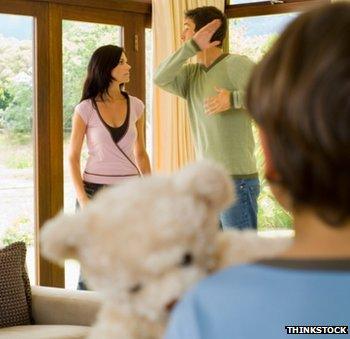Support for child domestic violence victims 'being axed'
- Published

Many children exposed to domestic violence suffer physical and emotional harm
Scores of support services for children who are exposed to domestic violence have been closed because of funding cuts.
Thirty-five shut between 2010 and 2013 - about 15% of the total number of services in England, according to the charity Women's Aid.
The Local Government Association said the services should be "one of the last to face cuts", but that local councils were struggling with funding for charities and voluntary services.
"Local councils have helped where they can but they're coming to us increasingly to tell us that that their other streams of funding have dried up, a lot of them had funding from the lottery and that's gone. Other private sources have dried up and so obviously they're coming back to us and saying, 'Please help us', and where we can we do," Ann Lucas of the Local Government Association told the BBC's 5 live Investigates programme.
She added that in October "police and crime commissioners will have responsibility for commissioning victims' services and we need to pool other diminishing resources."
The Department of Health says 750,000 children a year witness domestic violence.
There are currently around 200 specialist domestic abuse services for children and young people in England.
The NSPCC, for example, runs 14 across the country. They offer support for children to talk about their concerns and practical advice on how to stay safe.
Women's Aid says while all regions lost services, the South West has been hardest hit, losing seven of its 24 children's services - nearly 30%. The West Midlands saw five of its 22 services close, and the South East nearly 20%.
It says many organisations no longer receive funding from local authorities to run children's services and are forced to use their cash reserves - a situation which is unsustainable.
Polly Neate, the chief executive of Women's Aid, said: "Three-quarters of a million children are exposed to domestic violence each year, and such exposure is now well recognised as a form of child abuse.
"Children who witness domestic violence or who are abused alongside their mothers often suffer serious psychological consequences, including depression, anxiety and post-traumatic stress disorder.
"Their behaviour, education, future relationships and health can be affected for the rest of their lives, which is why it's so vital there are specialist children's services available to help children work through their experience of domestic violence."
The Association of Directors of Children's Services says local authority funding for such services has been among the hardest hit by spending cuts.
The value of these specialist services has been revealed in a recent report by the charity Caada, external - Co-ordinated Action Against Domestic Abuse.
It examined the cases of nearly 900 children who had been exposed to domestic violence. It found many suffered physical and emotional harm and a quarter displayed abusive behaviour.
However, researchers discovered the children's health and well-being improved significantly after support from specialist services, and abusive behaviour dropped from 25% to 7%.
Intervention 'crucial'
Margaret got help for her children at a centre run by the NSPCC after becoming concerned they could copy their father's violent behaviour towards her - and them. Her name has been changed to protect her identity.
"He would do a lot of it behind closed doors but I've realised that the children could actually hear him. He would be grabbing me, and shouting in my face and calling me an idiot and constantly saying I was having an affair.
"He said if the children told anybody what he was doing he would put them to bed with bloody faces."
Margaret said her husband was controlling and jealous of the children.
"If I had a child on my knee he would take the child off my knee so then he could have me all to himself. He cut my hair because he didn't like it. I was the one that had a big, thick cardigan on a summer's day because of marks."
She says intervention by the NSPCC was crucial for her children's well-being.
"Our normal would have been their normal, and the normal was that violence got you your way.
"I have no idea how they would have treated women. I really think that they could have been quite dangerous and volatile."
Caada's report also revealed that more than 60% of children who experienced domestic violence had suffered directly from emotional abuse, physical abuse or neglect and only half were known to local authority social services.
The full report was broadcast on 5 live Investigates on Sunday, 9 March on BBC Radio 5 live.
- Published3 December 2013
- Published2 December 2013
- Published29 August 2013